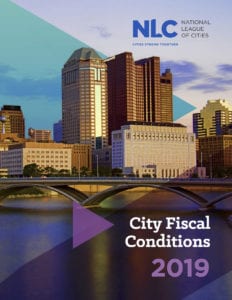Who is a member?
Our members are the local governments of Massachusetts and their elected and appointed leadership.
 Cities across the country are reporting increased fiscal uncertainty and trends similar to those that had emerged at the start of previous economic downturns, according to the National League of Cities’ annual “City Fiscal Conditions” report.
Cities across the country are reporting increased fiscal uncertainty and trends similar to those that had emerged at the start of previous economic downturns, according to the National League of Cities’ annual “City Fiscal Conditions” report.
The report, released on Oct. 28, analyzed survey results and fiscal data from more than 500 cities.
The findings include the following:
• General fund revenues slowed to their lowest annual growth rate since 2013.
• For the first time in seven years, cities anticipate a decline in revenue as they close the books on fiscal 2019.
• Declining fiscal conditions hit the Midwest hardest, as overall general fund revenues in cities there declined by 4.4 percent.
• Property tax receipts are showing signs of weakening, notably in the Midwest.
• Spending growth has outpaced revenue growth in recent years, and this trend is expected to continue.
• Two-thirds of big cities predict a recession will hit in 2020 or 2021.
Three out of four local finance officers remain confident, however, about the ability of their cities’ budgets to meet the financial needs of their communities.
The NLC more closely examined fiscal trends by region and city this year, according to NLC CEO and Executive Director Clarence Anthony, to get a better sense of what communities are facing on the ground.
“It is clear that communities across the country – and their residents and businesses – are experiencing varying economic realities,” Anthony said in a press statement. “My hope is that local leaders continue to use this report to improve communications and outcomes within their own budget processes, and ultimately, to better support the needs of the people they serve.”
To prepare the report, the NLC conducts a national email survey of finance officers in U.S. cities each year from May to July. The survey asks officers to report on local fiscal policies, budget pressures and revenue, and expenditure data, and to assess their cities’ fiscal conditions. In addition, budget data for 200 of the largest cities were collected directly from online city budget documents. In total, the 2019 data were drawn from 554 cities.
“City fiscal conditions are a reflection of underlying economic factors,” said Christiana McFarland, the NLC’s research director and the report’s author. “While many local economies are healthy, global economic disruptions are starting to make an impact on fiscal health.”
• NLC City Fiscal Conditions 2019 (3M PDF)